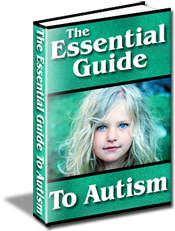Causes and Diagnosis of Autism
Click Here To Know The Simple Methods To Effectively Spot The 31 Signs of Autism
Autism is the most characteristic condition of the autistic spectrum disorders and is defined by impaired social interaction, obsessive and narrow interests, repetitive actions and difficulties in verbal and nonverbal communication. Children with autism are mostly diagnosed at the age of 3 when they show symptoms of an increased sensitivity to sound, light and touch and decreased sensation of pain. They avoid other children, resost cuddling, cannot understand other person?s needs and feelings.
The exact causes of autism are not yet known to scientists but they tend to incriminate for the occurrence of these disorders of both genetically and environmental factors. A series of genes on the chromosomes have been identified to be connected to the causes of autism. Also irregularities in certain brain areas have been matched to these type of disorders. According to some particular studies, an important trigger of autistic disorders is a low level of neurotransmitters like serotonin in the brain tissues. The genes responsible for the growth and interaction of the brain tissues and neurons could be blamed for an abnormal intrauterine development leading to later manifestations of some fetal life problems.
Another theory of the parental practices responsible for the apparition of autism is still discussed and researched. All theories regarding the cause of autism are still preliminary and yet to be proven.
Autistic disorders can appear in mild to severe forms or be masked by other handicaps. Diagnose is not always easy and certain. The clinical diagnose is established according to a list of the most characteristic signs. The group of symptoms orienting a specialist towards diagnose of autism consists of certain behavioral and physical changes. This group contains an impaired ability to make connections with other children or begin and sustain a conversation, the absence of imaginative social play methods, stereotyped and repetitive actions, limited interests, unusual language skills, obsessions regarding particular few objects and incapacity to accept certain rituals and routine changes.
Doctors use questionnaires or other screening instruments to evaluate the observations made by parents or by both parents and doctors. Certain questions regarding behavior and development are asked and related to obvious observations. A further evaluation when the suspicion of autism persists must be performed by a multidisciplinary team consisting of neurologists, psychiatrist, speech analyst and other professionals. A hearing evaluation must be completed in order to eliminate disorders caused by hearing difficulties.
After the completion of the testing, the parents are informed about results and possible therapy methods.
For greater resources on Autism or especially about autism symptoms checklist please click this link http://www.autism-info-center.com/autism-symptoms-checklist.htm
Labels: autism_com, autism_mild_symptom, autism_services, autism_statistics, autism_zyprexa

